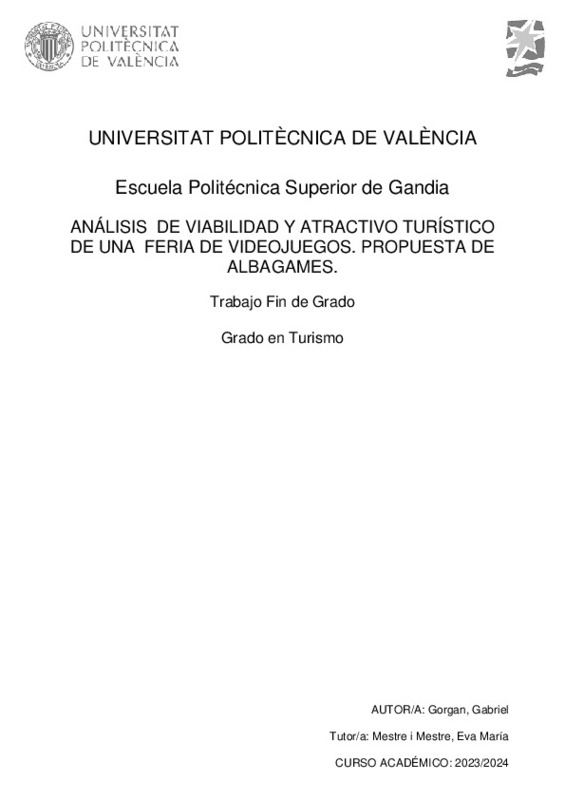|
Resumen:
|
[ES] El mundo cada día avanza más en la innovación y las nuevas tecnologías y dentro de este desarrollo
se encuentran los videojuegos, que van mejorando sus características y creando nuevos proyectos.
Paralelamente se ...[+]
[ES] El mundo cada día avanza más en la innovación y las nuevas tecnologías y dentro de este desarrollo
se encuentran los videojuegos, que van mejorando sus características y creando nuevos proyectos.
Paralelamente se ha ido incrementando el número de usuarios o jugadores que bien lo hacen por
diversión y pasar un buen rato con los amigos o la familia, o bien se dedican a ellos de forma más
competitiva en los e-Sports.
Este trabajo trata de analizar el atractivo turístico y la viabilidad de los festivales de videojuegos,
concretamente del que se celebra en Madrid llamado Madrid Games Week que trata de dar a
conocer los nuevos videojuegos que van a salir próximamente para las consolas de las grandes
empresas mundiales como SONY, Xbox (Microsoft), Nintendo entre otros, además ofrecer la
posibilidad probar algunas alfas de los nuevos juegos y otras actividades de ocio dentro del recinto
ferial.
Además, viendo el marco histórico de los e-Sports y el análisis del impacto económico y
sociodemográfico que originó este evento en los últimos años desde su inicio en 2013 hasta el 2019,
se pretende dar una idea de la importancia que tienen estos eventos en el sector turístico de España,
a través de los datos y se hace una propuesta de creación de un nuevo evento parecido llamado
“AlbaGames”, enfocado en los juegos de realidad virtual.
La metodología del trabajo utilizada es el estudio de los datos cualitativos y cuantitativos publicados
sobre este tipo de eventos, elaborado una encuesta que se ha enviado a un total de 70 personas y
realizando un DAFO para previsualizar el entorno de este nuevo evento y su viabilidad llegando a
una conclusión.
Finalmente, este tipo de eventos tienen en cuenta los Objetivos de Desarrollo Sostenible (ODS) que
se expondrán y comentarán los más relevantes en el Anexo I donde se muestra el grado de relación
que tiene este trabajo con cada uno de los objetivos.
[-]
[EN] The world advances more every day in innovation and new technologies and within this
development are video games, which are improving their characteristics and creating new projects.
At the same time, the number of ...[+]
[EN] The world advances more every day in innovation and new technologies and within this
development are video games, which are improving their characteristics and creating new projects.
At the same time, the number of users or players who either do it for fun and have a good time with
friends or family, or who dedicate themselves to them in a more competitive way in e-Sports, has
been increasing.
This work tries to analyze the tourist attraction and viability of video game festivals, specifically the
one held in the capital of Spain called Madrid Games Week, which tries to publicize the new video
games that are going to be released soon for the consoles of large global companies such as SONY,
Xbox (Microsoft), Nintendo among others, also offer the possibility of testing some alphas of the
new games and other leisure activities within the fairgrounds.
Furthermore, looking at the historical framework of e-Sports and the analysis of the economic and
sociodemographic impact that this event caused in recent years from its beginning in 2013 to 2019,
it is intended to give an idea of the importance that these events have in the tourism sector of Spain,
through the data and a proposal is made to create a new similar event called “AlbaGames”, focused
on virtual reality games.
The work methodology used is the study of the qualitative and quantitative data published on this
type of events, developing a survey that has been sent to a total of 70 people and carrying out a
SWOT to preview the environment of this new event and its viability. to a conclusion.
Finally, these types of events take into account the Sustainable Development Goals (SDGs), which
will be presented and the most relevant ones will be commented on in Annex I, which shows the
degree of relationship that this work has with each of the objectives.
[-]
|







